This is the latest letter in my regular, informal correspondence with Substacker and fellow Brit
, in which we take turns every other Wednesday to delve into the things that British people talk about the most. So that you can explore these unashamed clichés for yourself we’re inviting you to read our letters over our shoulders.My next ‘Dear Reader, I’m lost’ post will of course be published on Saturday.
Dear Terry,
Thank you for your latest letter, in which your kind compliment for my Austen appropriation had been so perfectly balanced with your unkind remark that I had ‘spoiled the plot of Mansfield Park’.
I am affronted by your ingratitude! Surely the whole point of a book review, particularly in the case of a volume extending to over 450 pages, is to save any would-be readers the efforts of picking the book up to read themselves?
😉
Since I’d first told you about my experience rediscovering Austen I have begun to listen to the audiobook of ‘Pride & Prejudice’, read beautifully by Clare Corbett. You can find it on BBC Sounds if you’d like to give it a spin. In three days I have reached chapter 18 of 61, and I’m absolutely engrossed.
I’d never read the novel but had thoroughly enjoyed Andrew Davies’ beautifully-shot adaptation which was broadcast on the BBC in 1995. I’m delighted to have found that the whole series is available on BBC iPlayer, and will almost certainly dive back into it as soon I’ve finished the audiobook.
Speaking of diving in, here’s a scene which I’m sure anyone who’s seen the series will remember:
Before I started listening to audiobooks I’d feared that the readers’ voices might perhaps colour my interpretation of the words; when I read a book book, you see, I read it in my own voice. I felt it might be a bit like seeing a film before you’ve read the book: in your head the characters are only ever going to look and sound like their portrayal on the screen. Well, gosh, I’d been missing out, because audiobooks are my new jam!
I still enjoy book books most of all, though, and last week in a local bookshop I was reminded of a bugbear I have around buying books online which can be avoided when buying one in person.
So many editions, both hardback and paperback, are so tightly bound and glued and the pages so narrow that much of the text in the centre of each spread is practically in the gutter. I don’t want to have to wrestle the book open to the extent that the glue cracks along the spine, and I need to be able to hold a paperback in just one hand when I’m reading in bed. Skimpy gutters just feel so mean – ungenerous – and I wish publishers would just give text room to breathe on the page. Surely the least expensive part of bringing a book to market is the paper? A few extra millimetres wouldn’t break the bank, would they?
I will often open different editions of the same book in bookshops, if indeed they carry more than one, in the hope of being able to identify the most user-friendly volume.
On the subject of the gutter – by which I now mean something undesirable, rather than book anatomy – you had posed this question in your letter:
Do you find that learning unpleasant things about a writer spoils your enjoyment of their work?
I was interested to read the responses of other readers in the comments thread of your post, in which many different opinions had been aired.
I find I can judge – for want of a better word – the writer and the work separately, on their own merits (or, indeed, their failings).
What I feel is very important, though, is that bringing the work and character of Dornford Yates, Dylan Thomas and T. S. Eliot – to use your examples – to the table gives us the opportunity to shine a light on any potentially shadowy attributes and discuss our feelings about them out in the open.
It’s a tricky one, Terry, but when it comes to formulating my opinion on a writer’s writing I let the work do the work.
Had you read about the Berkshire town of Twyford’s glee in having the missing apostrophe restored to the road sign at St Mary’s Terrace last week? I love stories like this:
And apostropedantry1 is alive and kicking right here in my village, albeit under slightly different linguistic circumstances. On the sign for the extension to South Street an example of what is commonly known as the ‘greengrocer’s apostrophe’ has been blanked out with a neat snippet of gaffer tape.
Greengrocer’s apostrophe: An incorrectly used apostrophe, especially one mistakenly used to form the plural of a noun, for example to write the plural of banana as banana’s instead of bananas.
Taken from Wiktionary
Something which had at the time been referred to in the press as ‘more catastrophe than apostrophe’ is still making me cross over two decades on.
Her horror that the apostrophe required for the title of the 2002 film ‘Two Weeks Notice’ was altogether absent had driven British author, journalist and broadcaster Lynne Truss to stand in front of the Odeon at Leicester Square holding an apostrophe on a stick in front of the backlit billboard in protest.
Missing apostrophe hyped as a catastrophe
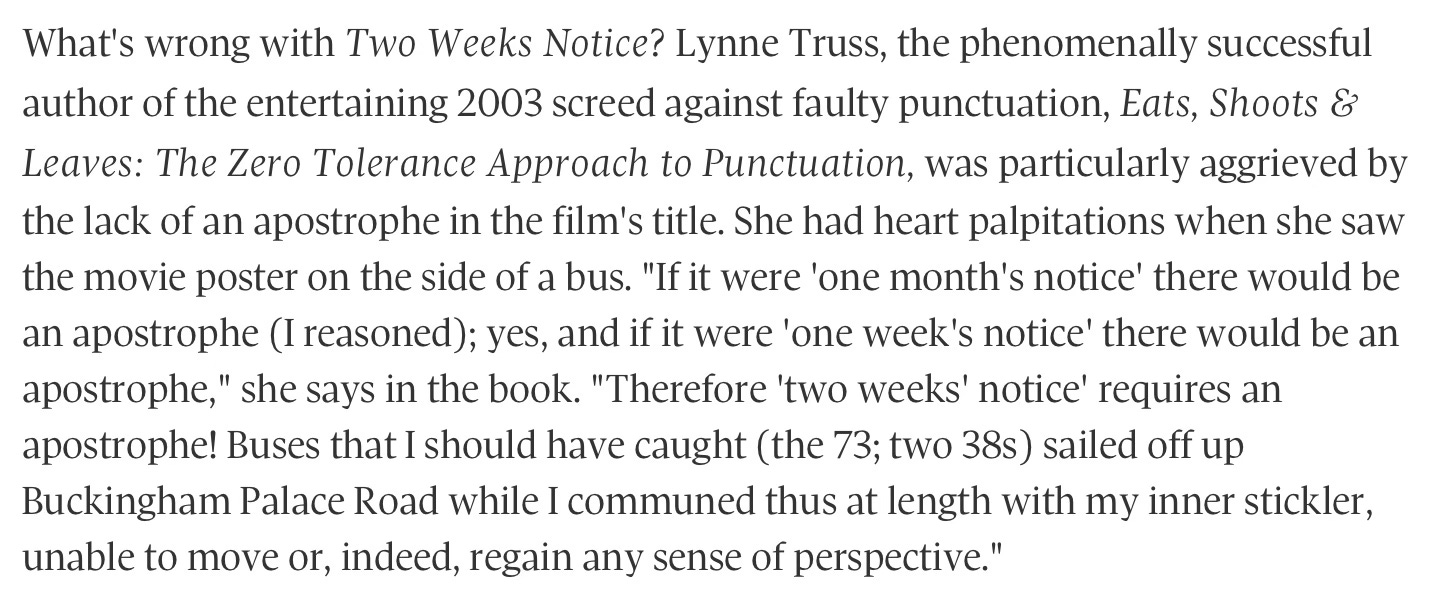
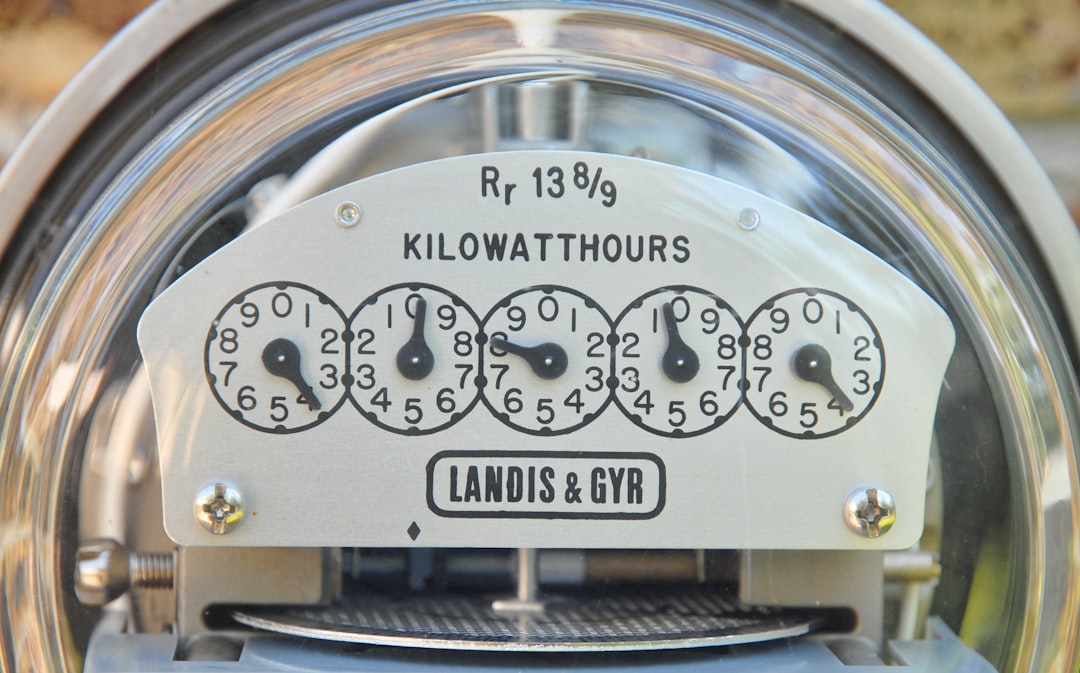
I enjoyed your tale of getting one up on the electricity people at your university hall of residence by wedging a coin in the meter to stop the wheel going round.
In my college laundry room back in the mid-90s a wash load cost £1.20, and dryer tokens, each representing quarter of an hour in the tumbler, were 35p. I would always need three tokens to get my clothes bone dry, and with cider being £1 a pint in the college bar, well, every penny counted.
To operate the machine you’d feed in each oblong token and turn the silver knob above the slot a quarter turn clockwise. The LED display would show ‘15’, and then you’d repeat the process with the next two tokens.
I watched in fascination one day as a fellow student armed, to my surprise, with a mechanical kitchen timer, fished a single dryer token out of his pocket and unwound from it a shiny tail of two layers of Sellotape stuck sticky side to sticky side. Having transferred his damp clothes from the washing machine to the dryer, and taking great care to hang onto the tail of tape, he popped the laminated token into the slot and turned the silver knob three times. Finally he pulled the token back out of the slot, turned the dial on his kitchen timer to 45 minutes, put that and the precious token into his pocket, grinned at me and left.
I saw him not many minutes later in the college bar, where he was enjoying a £1 pint of bitter. He hadn’t spent the £1.05 that I had on dryer tokens, Terry, and I wonder what he’d bought with the 5p he had left? 🤔
(I didn’t hear his timer go off. I do hope he remembered to collect his washing.)
Your ‘YOU ARE HERE’ map made me laugh! A geography teacher I know2 once told me that he despaired of his young pupils for their incontrovertible opinion that whichever way they ever happened to be facing was north.
I get it, though, I really do. Whenever Jim asks me which way we’re going, I too have a consistent answer.
‘Forwards!’ I tell him. 🤣
And it’s onwards and upwards with our letters, Terry! Next week we’ll have been corresponding for a whole year! Do write back soon, won’t you?
All the very best,
Rebecca
If you’ve enjoyed reading this letter to Terry, please let me know by clicking the heart. Thank you! My next ‘Dear Reader, I’m lost’ post will be published on Saturday.
You’ll find the rest of my letters in this series by clicking the ‘Letters to Terry’ tab on the top bar of my home page. Terry and I take it in turns to write to each other on alternate Wednesdays, and I really enjoy our light-hearted correspondence! You can access both Terry’s letters and mine using the index below:
Check out Terry's fabulous newsletter, and to make sure you don’t miss his reply to this letter next week, why not subscribe? You’ll be glad you did!
Last but not least, do please share and subscribe for free! Thank you!
Yup, made it up.
‘If you have a friend who’s a geography teacher, how come you get lost so often?’ I hear you ask. Yeah, it’s a mystery to all of us.

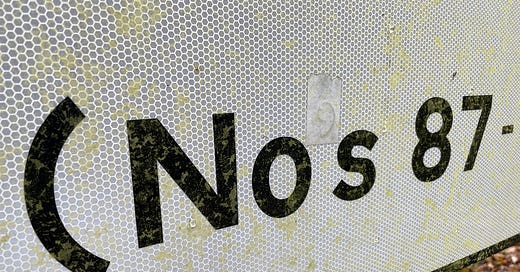


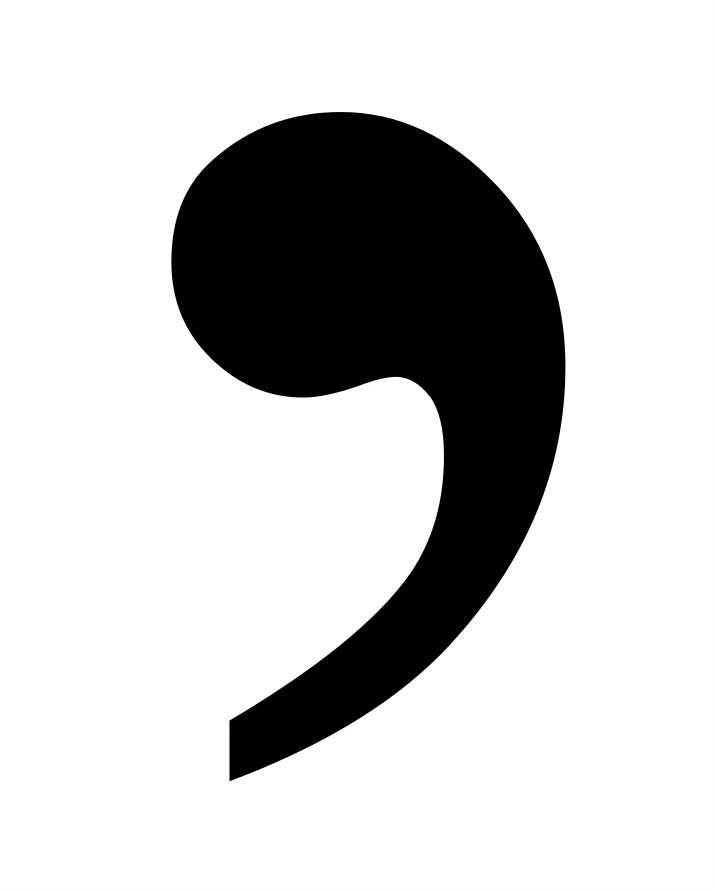

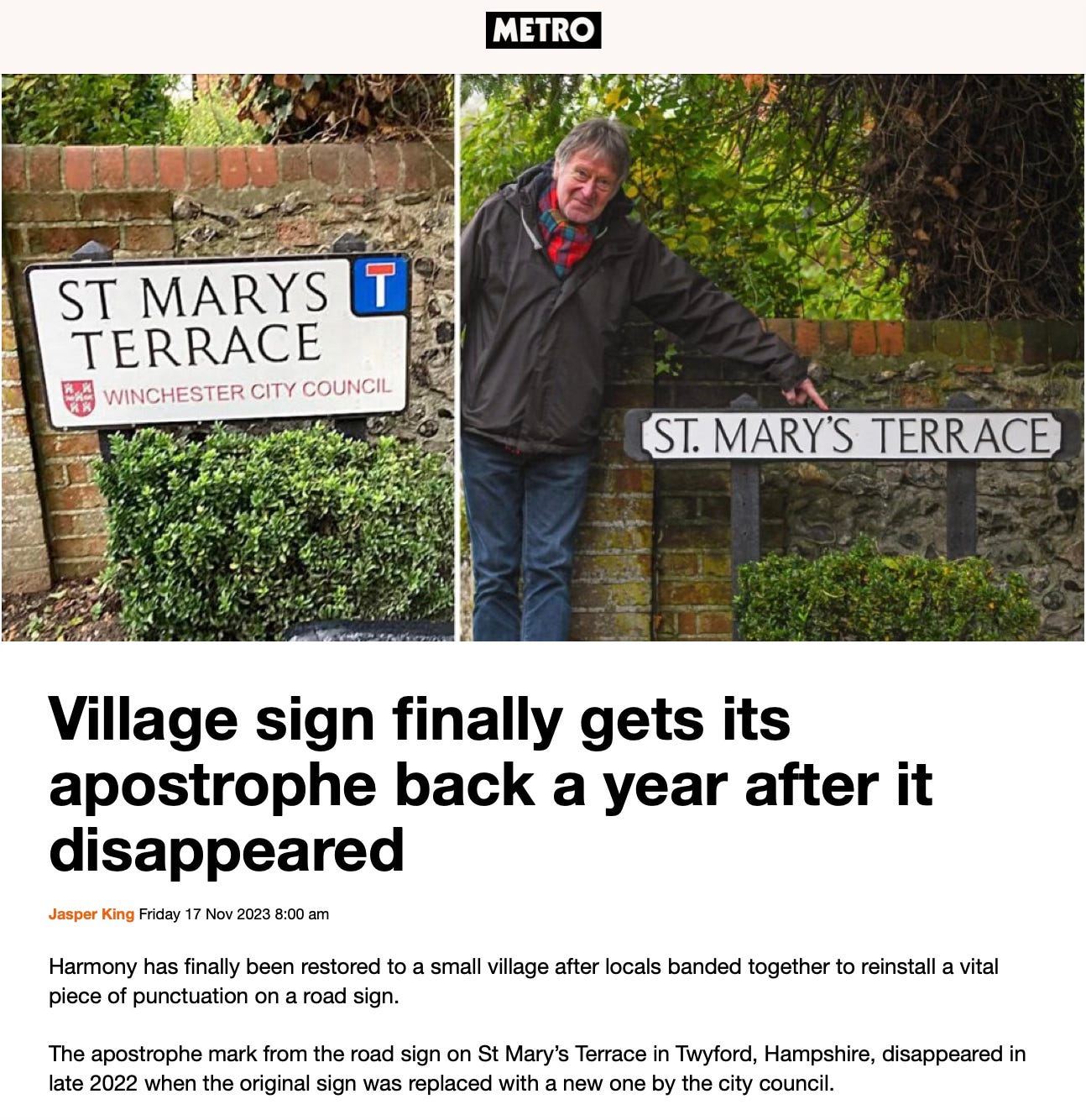
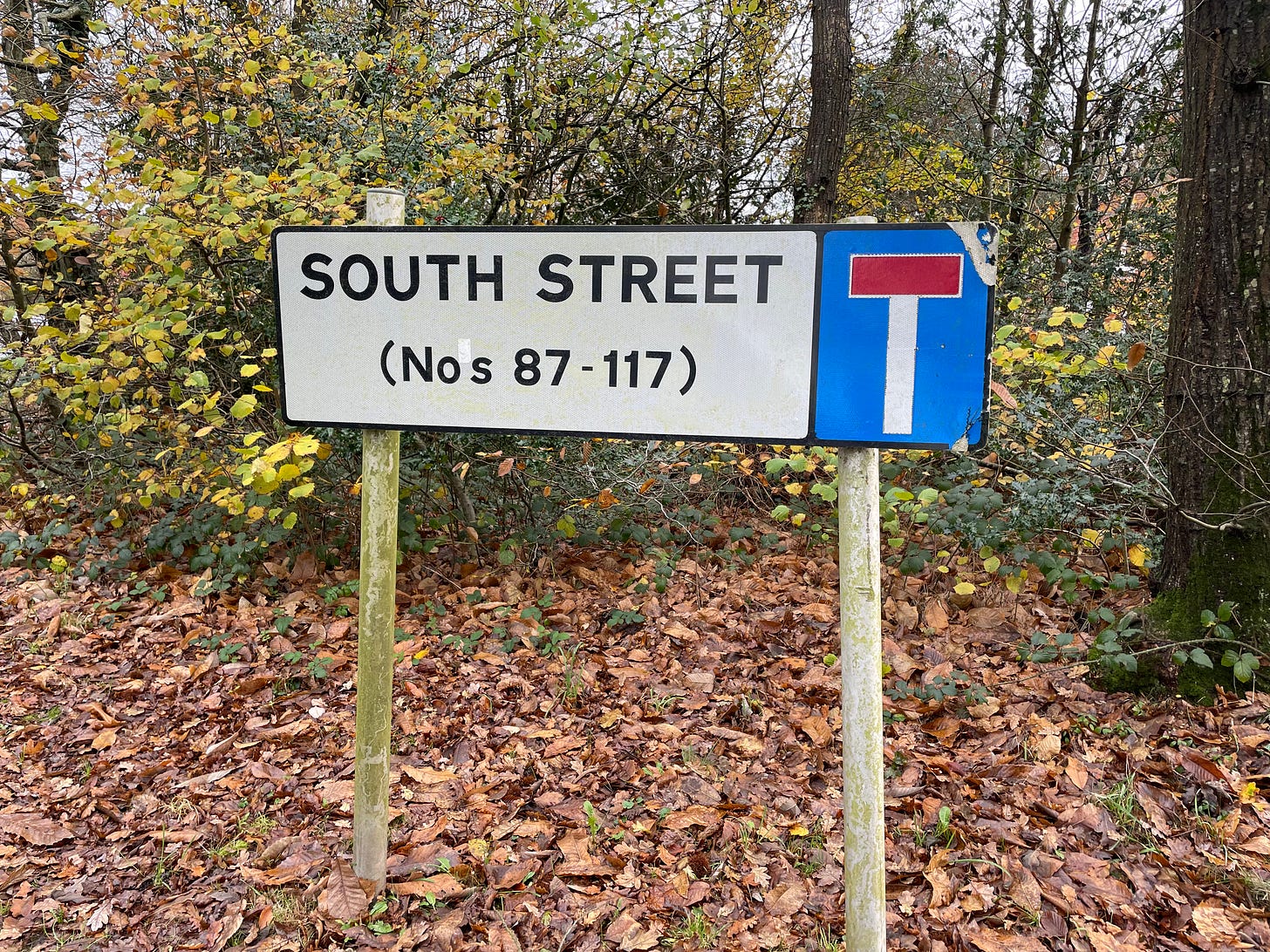

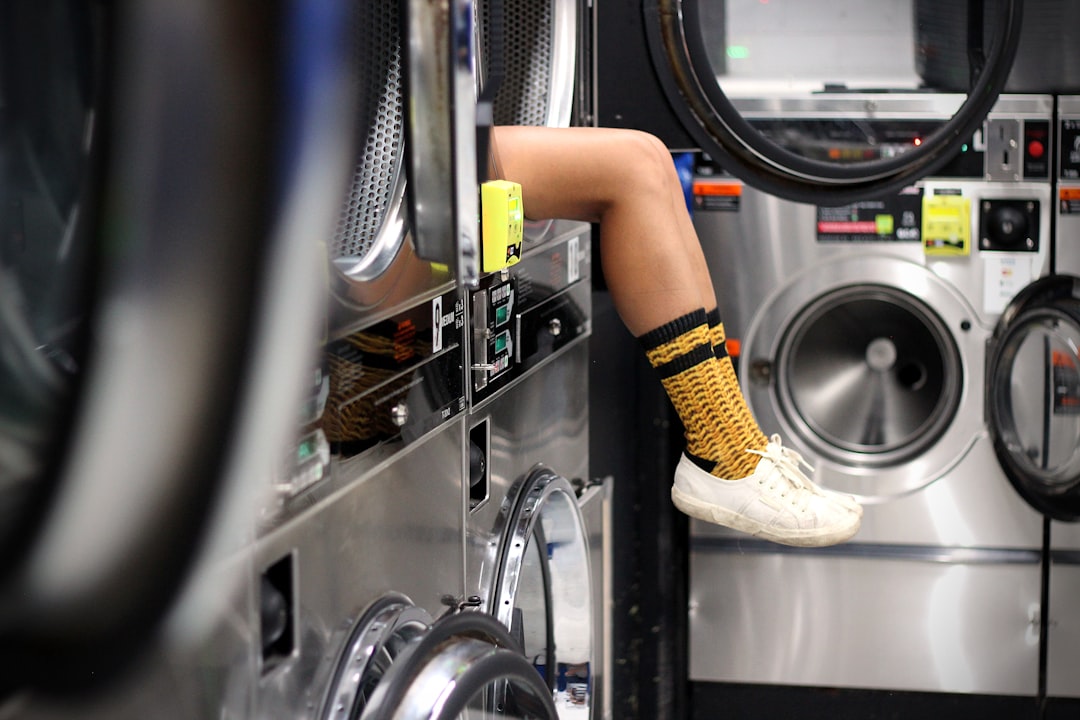


Pride and Prejudice. I purchased the set when it came out, and I would be embarrassed to tell you how many times I watched the entire series. Obsessively so. You chose the best scene, of course. When you watch the series again, notice how Colin Firth played Darcy as a very lonely, unhappy man. He does not smile once throughout the entire saga... until the very last scene in the wedding carriage. His whole face and posture changed. Thanks for the reminder. Love the letters!
That 1995 series. I never watched it, but also never had to, because my sister and my nan wore out the VHS recording she made when it aired on PBS. 😅 Their love for Colin Firth knew no bounds.